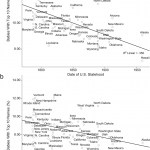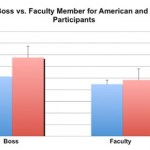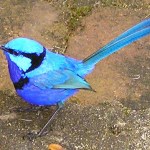
Here are my Research Blogging Editor's Selections for this week.
"Whether it's a raised eyebrow or curl of the lip, we usually think of emotions as conveyed through facial expressions and body language," writes BPS Research Digest's Christian Jarrett. But, how well can we communicate emotions purely through touch?
A great explainer post from the Neurobites blog. Exploring Phobias in the Brain. An Introduction.
Can fruit flies use their antennae to sense temperature? The answer seems to be yes, and the HighMag blog has the pictures to prove it.
Lots of animals are well aware that bigger means scarier. In stressful or aggressive situations, for example, the hair or fur of chimpanzees, rats, cats, and even humans stands up on end (in humans, given our lack of fur, this results in goose bumps) in an effort to dissuade a potential attack. Elephant seals use a display called "rearing up" to make themselves look bigger - as if they need to look bigger in the first place!
Since some animals tend to be good at looking bigger than they truly are, visual cues may not actually be a reliable method of sizing up another individual. In addition…
PsychBytes is an experiment: three recent findings in psychology, each explained in three paragraphs or less. Generally, these are papers that I wouldn't have otherwise covered in this blog. Please share your thoughts on this model in the comments. What works, and what doesn't? Would you like more PsychBytes in the future?
What's In A Name?
People who settle down and build a life in the frontier tend to be more individualistic, even if they started out with more interdependent values. Some features of the frontier life that would be attractive to an independent person are low population…
Here are my Research Blogging Editor's Selections for this week:
To start us off, a pair of killer posts by tag-teaming science-blogging super-duo Kate Clancy and Scicurious. First, check out The cerebellum and premenstrual dysphoric disorder at Sci's place, and then read Kate's take on the same research at Context and Variation. Or read Kate's first and then check out Sci's...either way.
Richard Landers tells us that There Are Four Kinds of Social Media Users. What kind are you?
Doctor Zen of NeuroDojo asks a question we've all been wondering: are cows magnetic sensors? What I want to know…
There is a small bit of land, only about a square kilometer, that has added a new wrinkle to the story of animal domestication. This bit of land located in Northern Jordan, just southeast of the Sea of Galilee near the banks of the Jordan River, is home to an archaeological site known as 'Uyun al-Hammam. One key feature of this site, excavated in 2005, is a burial ground containing the remains of at least eleven humans in eight different gravesites. The early humans were buried here sometime during the pre-Natufian period, or around 16,500 years ago.
Layout of the 'Uyun al-Hammam site, and…
"At home, a young man should be dutiful towards his parents; going outside, he should be respectful towards his elders." -Confucius (Chinese philosopher, 551-479 BCE)
"Your real boss is the one who walks under your hat." -Napoleon Hill (American author, 1883-1970)
Those two quotations reflect a cultural difference in how people construct their own conceptions of who they are and how they interact with others. That the particular culture an individual is raised in helps to determine the way they understand the self is clear. Western cultures, such as in America or the UK, tend to focus on…
Yesterday I posted this photo and offered up a prize for the best caption.
"Well, me and Joan been together...oh, 'most forty years now. Eats a lot, but she's been good to me, sure enough! Hey, don't make fun of the uniform... [whispers] Joan kinda' likes a man-in-uniform, servin' her dinners, knowwhatImean? [wink]"
The winner is Matthew Garcia (twitter / blog)!
The runner up, simply because I actually laughed out loud when I read it, is Enrique Guttierez (twitter / blog), who offered the following: "Hokey pokey!"
Gentlemen, email me or DM me your mailing addresses, and a limited edition…
This photo, titled "Zookeeper Ernie Bowman and Hippopotamus, Joan, London, 1934" comes to us via The Guardian.
Comment with your best photo caption - as many as you want. Winner will get a limited edition Scienceblogs Thoughtful Animal mug. I will chose a winner in 24 hours.
The photo is © 2011 Curatorial Assistance, Inc/E.O. Hoppé Estate Collection
Here are my Research Blogging Editor's Selections for this week:
I believe this is the first time I've featured a cartoon in my weekly editor's selections. Learn all about the Dunning-Kruger effect at Lost in Transcription.
Krystal D'Costa of Anthropology in Practice asks, Is A Kiss Ever Really Just A Kiss? and provides a nice taxonomy of flirting styles.
Finally, in honor of Valentine's Day, here's a post on hate. Yes, you read that right. By Melanie Tannenbaum at the ionpsych blog.
Part 2 of the n00b Science Blogging 101 series concerns the big questions of blogging: audience, purpose, and so on. You can find part 1 here, in which I discussed my own experiences with blogging to provide adequate context for this and the remaining posts in the series.
What audience do you have in mind when you write and why? Are you writing to people already interested in science, or do you also want to get people interested in science?
This is really two questions. The first concerns who reads this blog, and the second concerns who I wrote this blog for, and the second question is far…
Painstaking scientific research has identified seven dating tips that could boost your chances on Valentine's Day ... including shouting in his right ear and scaring him witless.
Whether or not you have a Valentine this year, head on over to check out to my latest piece in The Guardian: Valentine's Day dating tips from lovestruck scientists.
Photo: Getty Images/Brand X
Earlier today, I had the pleasure of speaking via Skype with Dan Simons's graduate-level science writing class. We talked about the ins and outs of academic blogging, and the nature and ecosystem of science communication online, and the students asked some terrific questions.
I had asked Dan to ask his students to compile some questions in advance, so that I might at least pretend to be prepared, and the questions they sent were so good, that I've decided to commit my answers to the relative permanence of the sciblogosphere. (Also, there was good feedback to a similar post that I wrote…
Here are my Research Blogging Editor's Selections for this week:
Let's start out with something particularly morbid (though potentially the best lede ever): "What effect do thoughts of death have on a typical person's desire for sex?" This fascinating post by Christian Jarrett of BPS Research Digest asks, when is death an aphrodisiac?
If death is an aphrodisiac, then tons of sex should be occurring in Pittsburgh right now, since When Your Super Bowl Team Goes Down, Your Death Risk Goes Up. David Berreby of Mind Matters explains.
I'm not sure why death is such a prominent theme this week, but…
Most dog owners think that their dogs can tell what they're thinking. Or at least, in some sense, they will insist that their pet pooches can sense their emotions, and respond accordingly.
Indeed, a man by the name of Karl Krall (say that three times fast) thought that there exist some sort of psychic connections between man and animal. And he thought he could prove it.
In this telepathy experiment between human and dog Karl Krall (on the right) tried to detect the thinking radiation he assumed to flow between the two. Krall was a rich dealer in diamonds who had founded his very own…
Here are my Research Blogging Editor's Selections for this week.
So much good stuff this week, it was hard to choose. But choose I must:
To start us out, Dr. Sharma of his eponymous blog discusses a new finding in neuroscience: is there a gene that's associated with the so-called sweet tooth?
Livia Blackburne tackles a fascinating question in her blog "A Brain Scientist's Take on Writing" - Typing vs. Longhand: Does it Affect Your Writing?
A Complete Stranger Understands You About As Well As Your Spouse Does. David Berreby of Mind Matters can help you understand what he means by this.
"Do…
It's like a scene out of Romeo and Juliet, or perhaps the Rapunzel story. A wild bald eagle has taken up residence on a tree just adjacent to a bald eagle enclosure at the Orange County Zoo in Irvine, near Los Angeles. In fact, the wild bird has shown particular interest in the zoo's 6-year-old female bald eagle, Olivia.
According to LAist:
In fact, the pair have been chatting it up--well, squawking back and forth, as the Zoo manager explains, and seem to have struck up a friendship. Is it bald eagle love? Zookeepers aren't sure, since they don't know the sex of the visiting bird, though its…
Production on Open Lab 2010 is proceeding apace, thanks to the valiant assistance of Blake Stacey. While we put the finishing touches on it, though, it is time to announce the sixth anthology.*
The submission form for the 2011 edition of Open Lab is now open. Any blog post written since December 1, 2010 is eligible for submission.
You can buy the last four annual collections here. You can read Prefaces and Introductions to older editions here. The instructions for submitting are here.
Here are the submission badges, designed again this year by Doctor Zen. You are encouraged to display them…
If you're plugged into the science blogtwitosphere, then you surely know that the topic of women science bloggers has been written about extensively. Rather than re-hash what many others have said, I'll direct you to these posts by Kate Clancy and Daniel Lende. Then, late last night, Ed Yong wrote a post highlighting a handful of blogs he reads that happen to be penned (typed?) by science writers who happen to possess two X chromosomes. I also noticed that of all the names and blogs that Ed listed, only one was new to me. Perhaps this is because I'm well-plugged-in to the sciblogtwitosphere,…
What's the best way for a lonely guy to get a date? If you're a Splendid Fairy-Wren (Malurus splendens, native to Australia), your best bet might be to frighten the object of your affection.
You've learned all about the birds and the bees; now it's time to learn from them.
Lots of research has shown that animals reduce their sexual behaviors when predators are around. After all, it isn't just potential mates who would see or hear an elaborate mating display, but also potential predators. The male splendid fairy-wren does something a little bit unusual, though. Gray Butcherbirds (Cracticus…
Here are my Research Blogging Editor's Selections for this week:
A new post by Scicurious recommends, "If you're trying to quit smoking, it's best to stay away from movies or TV shows depicting smoking, which might induce craving and cause you to relapse." Easier said than done, perhaps. Movies and the Smoking Brain.
Dirk Hanson of Addiction Inbox writes, "Every day, addicts are quitting drugs and alcohol by availing themselves of drug treatments that did not exist fifteen years ago." However, not every treatment works for everyone, and some of the differences in responses to specific anti-…











